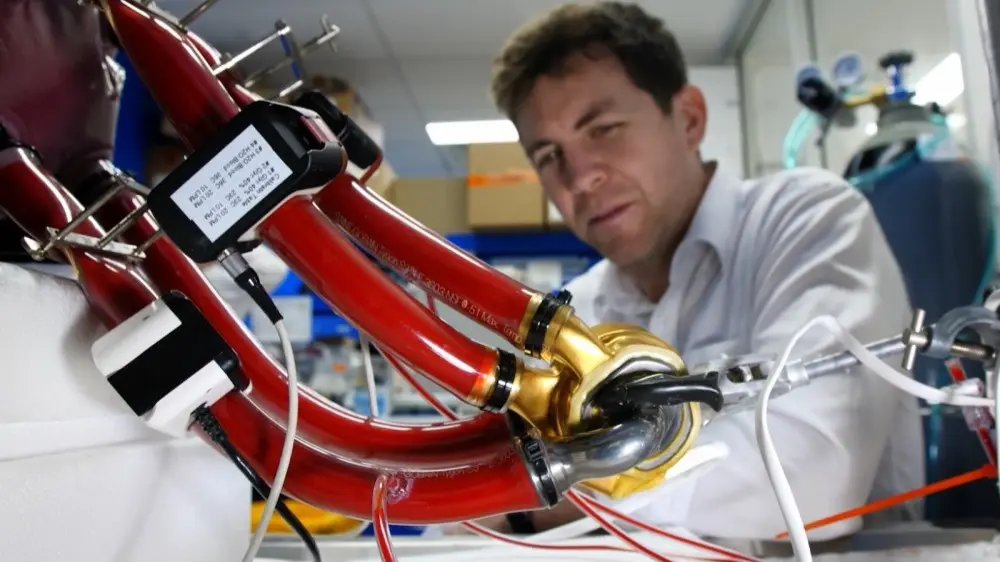Updated 14 March 2025 at 16:03 IST
Australian Man Becomes First to Live 100 Days with Titanium Artificial Heart
An Australian man in his forties became the first person in the world to leave a hospital and live 100 days with an artificial titanium heart.
- Science News
- 3 min read

Sydney: An Australian man in his forties became the first person in the world to leave a hospital and live 100 days with an artificial titanium heart, marking a historic milestone in medical science. The device, called BiVACOR, served as a temporary replacement until he received a human donor heart.
The patient underwent the first-of-its-kind surgery at St Vincent’s Hospital in Sydney and lived with the device for over three months before receiving a heart transplant. Hospital officials confirmed that he is recovering well after the transplant.
A Breakthrough in Heart Failure Treatment
The BiVACOR artificial heart was designed for patients with end-stage heart failure who are awaiting transplants. Previously, all five patients who received this device in the United States remained in hospitals until a donor heart was available. This Australian case marked the first time a patient lived outside a hospital with the device for an extended period.
“This is certainly an important development in the field,” said Julian Smith, a cardiac surgeon at the Victorian Heart Institute at Monash University.
Advertisement
What Makes BiVACOR Unique?
The BiVACOR artificial heart was invented by biomedical engineer Daniel Timms and works differently from traditional mechanical heart devices.
Advertisement
- It functions as a continuous pump with a magnetically suspended rotor that propels blood throughout the body in pulses.
- Unlike conventional mechanical hearts, which have multiple parts that wear out, BiVACOR has only one moving part, making it more durable and reliable.
- A cord connected under the skin links the device to a portable external controller that runs on batteries during the day and can be plugged in at night.
Experts Weigh In
Medical experts hailed the success of this case but emphasized that more research was needed.
“It is incredibly innovative,” said Sarah Aitken, a vascular surgeon at the University of Sydney. However, she cautioned that there were many unanswered questions about the long-term functionality and cost of the device.
“This kind of research is really challenging to do because it is very expensive and the surgery involved is very high-risk,” she added.
What This Means for Future Patients
The success of BiVACOR could pave the way for more long-term artificial heart solutions, especially for patients who are not eligible for transplants due to age or health conditions.
“There weren’t being constantly monitored by medical teams,” said Joseph Rogers, a heart-failure cardiologist and president of the Texas Heart Institute, who led the first BiVACOR trial in the United States last year.
In the United States alone, nearly 7 million adults suffer from heart failure, yet only about 4,500 heart transplants were performed in 2023 due to a severe shortage of donor hearts.
United States Trials and FDA Approval
The United States Food and Drug Administration (FDA) has approved further trials of BiVACOR, expanding testing to 15 more patients. The goal is to determine whether the device could eventually become a permanent alternative to heart transplants.
Additionally, in February 2025, the FDA approved the first trial for pig-organ transplants, another possible solution to address the global shortage of donor hearts.
“This is just the beginning,” said William Cohn, a heart surgeon at the Texas Heart Institute and chief medical officer at BiVACOR. “We have improved the device to reduce the risk of failure, and we are optimistic about its future.”
The groundbreaking Australian case has provided researchers with critical real-world data, offering hope to millions of heart failure patients worldwide.
Published By : Medha Singh
Published On: 14 March 2025 at 16:03 IST
